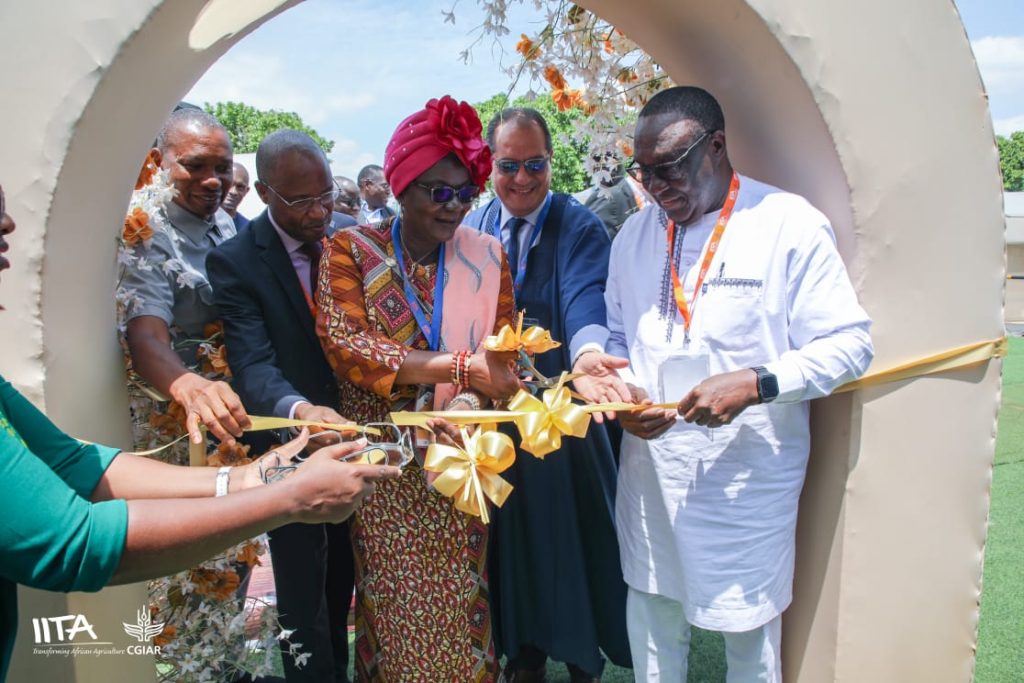The Regional Hub for Fertilizer and Soil Health for West Africa and the Sahel has officially opened at the International Institute of Tropical Agriculture, IITA Headquarters in Ibadan, Nigeria, to significantly enhance agricultural productivity and sustainable profitability across West Africa and the Sahel. By 2033, the Hub will help increase yields and income for three million farmers, improve soil health on 1.5 million hectares of land, and equip 1.5 million farmers to adapt to climate change.
The Hub leverages a step-change in coordination and collaboration to tackle the critical agricultural production challenges in the region by promoting sustainable soil health and optimum fertilizer practices that will enhance the sustainability and resilience of agricultural production and food security.
“This regional Hub is a groundbreaking step towards revolutionizing agricultural practices in West Africa and the Sahel,” remarked Simeon Ehui, Director-General of IITA. “By leveraging our extensive research experience and collaborating with key stakeholders, we will empower farmers with the knowledge and tools to improve soil health and achieve sustainable food security across the region.”
In Africa, two-thirds of the land available for agricultural production is considered degraded, resulting in low crop and livestock productivity, poverty, and degradation of natural resources. Average fertilizer application rate is 22 kilograms per hectare, compared to a world average seven-times higher (146 kilograms per hectare), while skyrocketing and highly volatile fertilizer prices reduce their application even further.
Moreover, the fertilizers applied are not always suitable to the soil and crops needs, and complementary inputs and advisory services are usually missing, leading to low profitability for the farmer and sometimes even further soil degradation in the long run.
The new Hub combines cutting-edge laboratory testing and training facilities with cross-sector experts including the private sector to support development and delivery at scale of advanced soil health and fertilizer technologies. It provides access to rigorous internal scientific research and on-farm testing, ensuring practical solutions tailored to farm-specific challenges and thereby delivering significant value to growers.
“The Fertilizer and Soil Health Hub is critical for agricultural development in West Africa,” commented Mrs. Massandje Toure-Litse, ECOWAS Commissioner for Economic Affairs and Agriculture at the Economic Commission for West African States (ECOWAS). “By focusing on knowledge sharing, capacity development, and evidence-based practices, it perfectly aligns with the strategic guidance outlined in the Lomé Declaration on Fertilizers and Soil Health in West Africa and the Sahel, adopted on May 2023 to empower our member states to achieve their sustainable agriculture goals.”
The Hub’s strategy is framed by the priorities of the Fertilizer and Soil Health Roadmap 2023 and the Nairobi Declaration from the Africa Fertilizer and Soil Health Summit 2024. The Hub is propelled by significant financial commitments, including support from the World Bank ($10 million) over the next five years through the Accelerating Impacts of CGIAR Climate Research for Africa (AICCRA) project, and from OCP Africa over the same period.
“We are committed to helping achieve Sustainable Development Goals 2 and 13 to eliminate hunger, achieve food security, improve nutrition and promote sustainable agriculture, and to take urgent actions to address climate change and its impacts,” said Chakib Jenane, World Bank Regional Director for Sustainable Development. “Integrated soil fertility management and the restoration of soil health are therefore key to ensure the resilience of food systems and achieve food security in West Africa and the Sahel.”
The operationalization of the Hub is part of commitments signed in Marrakech in October 2023 between the World Bank, IITA, and OCP Africa. “OCP Africa is demonstrating a strong commitment to sustainable agriculture and food systems in Africa. Our contribution to the establishment of this Hub underscores our dedication to these goals, and our unconditioned commitment to make the program a pilot to be upscaled in all the continent, » said OCP Africa’s CEO, Dr. Mohamed Anouar Jamali.
About the Regional Hub:
The Regional Hub for Fertilizer and Soil Health for West Africa and the Sahel is a collaborative effort initiated at the Africa Fertilizer and Soil Health Summit in Nairobi on May 8, 2024, focusing on combating soil health decline in the region. It brings together key stakeholders, including IITA, OCP Africa, the African Plant Nutrition Institute (APNI), University Mohammed VI Polytechnic (UM6P), International Fertilizer Development Centre (IFDC), and the World Bank. The Hub invites partnerships with other organizations, research institutions, and private sector entities to achieve a thriving agricultural future in the region.
Send your press invite, news, press releases/articles to augustinenwadinamuo@yahoo.com. Also, follow us on Twitter @PrimetimeRepor1 and on Facebook on facebook.com/primetimereporters or call the editor on 07030661526.

